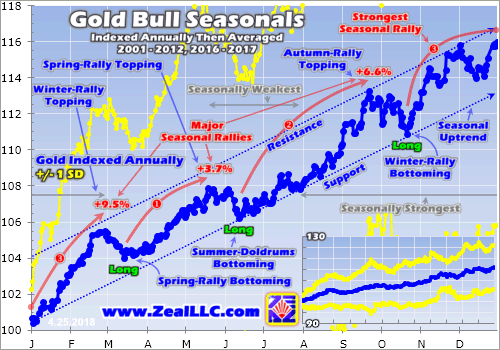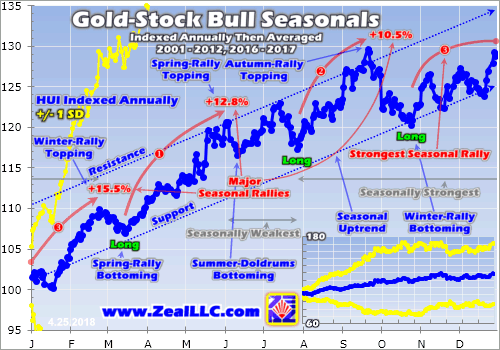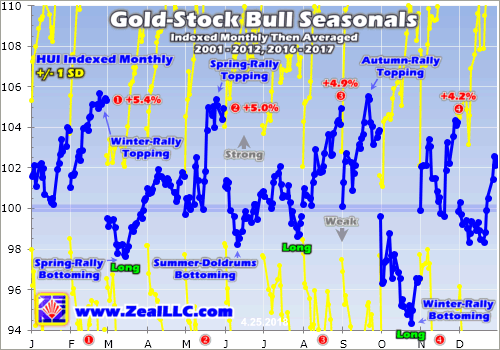
The gold miners’ stocks have mostly been consolidating low this year, exacerbating bearish sentiment. Even with gold grinding higher in a solid uptrend and nearing a major upside breakout, the gold stocks just can’t get any love. But that may be about to change, with gold and its miners’ stocks in the midst of their spring rally. Strong seasonal tailwinds make May one of the best months of the year in gold-stock bulls.
Gold-stock performance is highly seasonal, which certainly sounds odd. The gold miners produce and sell their metal at relatively-constant rates year-round, so the temporal journey through calendar months should be irrelevant. Based on these miners’ revenues, there’s little reason investors should favor them more at certain times of the year than others. Yet history proves that’s exactly what happens in this sector.
Seasonality is the tendency for prices to exhibit recurring patterns at certain times during the calendar year. While seasonality doesn’t drive price action, it quantifies annually-repeating behavior driven by sentiment, technicals, and fundamentals. We humans are creatures of habit and herd, which naturally colors our trading decisions. The calendar year’s passage affects the timing and intensity of buying and selling.
Gold stocks exhibit strong seasonality because their price action mirrors that of their dominant primary driver, gold. Gold’s seasonality generally isn’t driven by supply fluctuations like grown commodities experience, as its mined supply remains fairly steady all year long. Instead gold’s major seasonality is demand-driven, with global investment demand varying dramatically depending on the time within the calendar year.
This gold-demand seasonality is well-known and heavily studied. The seasonal gold year starts in late July as Asian farmers begin reaping their harvests. They plow some of their surplus income into gold. That’s followed by the famous Indian wedding season in autumn, with its heavy gold buying for brides’ dowries. That culture believes festival-season weddings have greater odds of yielding long, successful marriages.
After that comes the Western holiday season, where gold jewelry demand surges for Christmas gifts for wives, girlfriends, daughters, and mothers. Following year-end, Western investment demand balloons after bonuses and tax calculations as investors figure out how much surplus income the prior year generated for investment. Then Chinese New Year gold buying flares up after that heading into February.
These understandable cultural factors drive surges of outsized gold demand between summer and late winter. But interestingly there is one more gold-demand spike in spring. Over the years I’ve seen a variety of theses explaining this April-and-May seasonal gold rally, but nothing definitive like for the rest of the year’s gold seasonality. As silly as it sounds, I suspect spring itself is the reason for this demand surge.
Sentiment exceedingly influences investing, which requires optimism for the future. Investors won’t risk deploying their scarce capital unless they believe it will grow. And the glorious expanding sunshine and warming temperatures of spring naturally breed optimism. The vast majority of the world’s investors are far enough into the northern hemisphere that spring has a major impact. This seasonality extends to stocks too.
Since it’s gold’s own demand-driven seasonality that fuels the gold stocks’ seasonality, that’s logically the best place to start to understand what’s likely coming. Price action is very different between bull and bear years, and gold is absolutely in a young bull market. After being crushed to a 6.1-year secular low in mid-December 2015 on the Fed’s first rate hike of this cycle, gold powered 29.9% higher over the next 6.7 months.
Crossing the +20% threshold in early March 2016 confirmed a new bull market was underway. Gold corrected after that sharp initial upleg, but normal healthy selling was greatly exacerbated following Trump’s surprise election win. Investors fled gold to chase the taxphoria stock-market surge. Gold’s correction cascaded to monstrous proportions, hitting -17.3% in mid-December. But that was shy of a new bear’s -20%.
Gold’s last mighty bull market ran from April 2001 to August 2011, where it soared 638.2% higher! And while gold consolidated high in 2012, that was technically a bull year too since gold just slid 18.8% at worst from its bull-market peak. Gold didn’t enter formal bear-market territory at -20% until April 2013, thanks to the crazy stock-market levitation driven by extreme distortions from the Fed’s QE3 bond monetizations.
So the bull-market years for gold in modern history ran from 2001 to 2012, skipped the intervening bear-market years of 2013 to 2015, and resumed in 2016 to 2017. Thus these are the years most relevant to understanding gold’s typical seasonal performance throughout the calendar year. We’re interested in bull-market seasonality, because gold remains in its young bull today and bear-market action is quite dissimilar.
This chart averages the individually-indexed full-year gold performances in those bull-market years from 2001 to 2012 and 2016 to 2017. 2018 isn’t included yet since it remains a work in progress. This chart distills out gold’s bull-market seasonal tendencies in like percentage terms. Quantifying gold’s bull-market seasonal tendencies requires all relevant years’ price action to be recast to be perfectly comparable.
That’s accomplished by individually indexing each calendar year’s gold price action to its final close of the preceding year, which is recast at 100. Then all gold price action of the following year is calculated off that common indexed baseline, normalizing all years regardless of price levels. So gold trading at an indexed level of 105 simply means it has rallied 5% from the prior year’s close, while 95 shows it’s down 5%.
This methodology renders all bull-market-year gold performances in like percentage terms. That’s critical since gold’s price range has been so vast, from $257 in April 2001 to $1894 in August 2011. Finally each calendar year’s individually-indexed gold prices are averaged together to arrive at this illuminating gold-bull seasonality. Gold has always tended to enjoy strong rallies in the spring months of April and May.

During these modern bull-market years from 2001 to 2012 and 2016 to 2017, gold’s spring rally tended to start in mid-March on average. From that major seasonal low following the winter rally, gold often starts grinding higher before its gains accelerate through April and most of May. This spring rally has generally run its course by late May. Across the 14 bull years in this study, gold averaged nice spring rallies of 3.7%.
This spring rally unfolds rapidly, with an average duration of just 2.2 months. That makes it the smallest and shortest of gold’s three major seasonal rallies, falling way behind the champion 9.5% winter rally that precedes it and strong 6.6% autumn rally that follows the summer doldrums. Nevertheless, it is still well worth trading. 3.7% gains still really make a difference, and naturally about half of years exceed this average.
This year gold’s spring-rally bottoming came on March 20th, when gold closed at $1310 the day before the Fed was universally expected to hike for the 6th time in this cycle. That was March’s 14th trading day this year, right in line with gold’s average seasonal low on March’s 10th trading day. And so far gold has largely followed the spring-rally seasonal pattern since, gradually grinding higher from late March to mid-April.
Climbing the typical 3.7% from that spring low into May’s spring-rally topping would propel gold to $1358. That’s right on the verge of being a major decisive breakout from the horizontal $1350 resistance line that gold-futures speculators watch like hawks. And it isn’t far from new bull-market highs above July 2016’s $1365 bull-to-date peak. As I wrote last week, this spring rally really ups the odds gold is nearing a bull breakout!
And given its performance in April, gold ought to see a bigger May rally than usual this year. On average in these 14 modern bull-market years, gold climbed 1.8% in Aprils then another 1.3% into its late-May spring-rally toppings. But as of the middle of this week, gold was actually down 0.1% month-to-date in April. That’s poor performance by April standards, setting up this May for a strong mean-reversion rally.
Historically this spring-rally April-May span is often self-equalizing. If gold materially underperforms or outperforms its seasonal averages in April, its May performances tend to mean revert and overshoot in the opposite direction. Back in 2009 for example, gold fell 3.4% in April but then blasted 10.0% higher in May! In 2016 gold surged 5.1% in April before dropping 6.1% in May. Weak Aprils often lead to strong Mays.
If gold is bid too aggressively in April, the resulting excitement entices in and exhausts all available near-term buying before the summer doldrums. That certainly hasn’t happened this year. Gold rallied into mid-April, but reversed sharply on a strong short-covering rally in US Dollar Index futures. Thus gold has largely drifted sideways on balance this month. So the usual spring buying likely hasn’t even started yet!
That leaves traders with full capital firepower to flood back in in May, likely as the sharp USDX rally runs out of steam. The delayed spring-rally gold buying this year can all be compressed into May, which really increases the odds of outsized gains. While nothing is guaranteed in seasonals since they merely use multi-year averages to reveal trend tendencies, strong Mays are definitely more likely following weak Aprils.
And as goes gold, so go gold stocks. Gold stocks also exhibit strong seasonality, which is of course the direct result of gold’s own seasonality. Since gold-mining costs are largely fixed when mines are being planned, fluctuations in gold’s price flow directly into amplified moves in gold-mining profits. Higher gold prices drive much-higher earnings for the gold miners, which attract in more investors to bid up stock prices.
The ironclad historical relationship between the price of gold, gold-mining profitability, and therefore the gold-stock price levels is exceedingly important to understand. If you need to get up to speed, I wrote an essay looking at gold-stock price levels relative to gold early last month. Fundamentally gold stocks are leveraged plays on gold. Thus they really outperform in the spring due to gold’s strong seasonal rally.
This next chart applies this same bull-market-seasonality methodology used on gold directly to the gold stocks. It looks at the average annual indexed performance in the flagship HUI NYSE Arca Gold BUGS Index in these same bull-market years of 2001 to 2012 and 2016 to 2017. Because of gold’s dominant influence over gold-mining earnings, gold-stock seasonality naturally mirrors and amplifies gold’s own seasonality.

Gold stocks’ seasonal spring rally is much stronger than gold’s, buttressing that spring-optimism-drives-stock-buying thesis. Between mid-March and early June, the gold stocks have averaged hefty 12.8% rallies in these 14 modern bull-market years. That makes for exceptional 3.5x upside leverage to gold’s 3.7% seasonal spring rally! Interestingly this is gold stocks’ best seasonal leverage to gold’s gains by far.
While the HUI averaged 15.5% surges during gold’s winter rally, that only made for 1.6x upside leverage to gold’s big 9.5% gain. And the HUI’s 10.5% average gain during gold’s autumn rally also only amplified gold’s 6.6% gain by 1.6x. So while the gold-stock spring rally’s 12.8% average gains rank second out of these three seasonal rallies, it offers the most bang for the buck in gold-stock upside compared to gold!
This year the gold stocks’ spring-rally bottoming happened on March 20th, the same day as gold’s. The HUI slumped to 169.2 that day. Since then this leading gold-stock index has recovered 6.9% as of the middle of this week, trouncing gold’s 1.0% spring-rally gains so far. A merely-average spring rally would take the HUI to 190.9 by late May or early June, which is another 5.6% higher from here. That’s worth riding.
But if gold’s seasonal spring rally is compressed into May, and strong buying forces it over $1350 or even better its $1365 bull-to-date high, the gold miners’ stocks have far more near-term upside potential. For the most part gold stocks remain deeply out of favor, forgotten or ignored. But they will explode back on to speculators’ and investors’ radars if major new gold highs attract the financial media’s interest and attention.
Again as I discussed last week, gold’s nearing bull breakout will work wonders for not only psychology but hard gold-mining profits. The gold stocks are radically undervalued today compared to their actual underlying fundamentals. In Q4’17 gold averaged about $1276 per ounce, but the major gold miners of the leading GDX VanEck Vectors Gold Miners ETF reported average all-in sustaining costs of just $858 per ounce!
So they were already collectively earning fat operating profits of $418 per ounce. And these are going to soar in Q1’18, because the average gold price surged 4.1% quarter-on-quarter to $1329. Since mining costs are largely fixed, all-in sustaining costs will likely stay flat from Q4. That means major gold miners’ operating profits are likely to rocket 12.7% QoQ to $471 per ounce! That will delight contrarian investors.
The gold miners will be releasing these latest Q1 results between now and mid-May, right when gold is powering higher in its seasonal spring rally. So the gold stocks are certainly set up for an outsized spring rally this year! The potent combination of absurdly-cheap gold-stock prices, surging earnings forcing their valuations even lower, and higher gold prices attracting financial-media attention should really stoke traders’ interest.
This last chart breaks down gold-stock seasonality into even-more-granular monthly form. Each calendar month between 2001 to 2012 and 2016 to 2017 is individually indexed to 100 as of the previous month’s final close, then all like calendar months’ indexes are averaged together. Slicing up seasonal tendencies this way shows May has averaged the second-strongest monthly gold-stock gains in modern bull-market years.

During these 14 Aprils in modern gold bull-market years, the gold stocks as measured by the HUI saw average gains of 1.6%. But the lion’s share of the spring-rally gains came in May, where average gains more than tripled to 5.0%! For decades if not longer, May has been one of the best and most-important months to be heavily long gold miners’ stocks. Only February proved better seasonally at a +5.4% average.
The key to gold stocks’ spring rally is to get your capital deployed in mid-March, when gold stocks swoon to their spring-rally bottoming. In intra-month terms the initial gains are often fast in late March as gold stocks rebound out of oversold lows. But then the spring rally tends to slow down in April, discouraging impatient and short-sighted traders. The real gains come in May, and next month’s setup is exceptionally bullish.
Of course the standard seasonality caveat applies that these are mere tendencies, not primary drivers of gold or gold stocks. Seasonal tailwinds can be easily drowned out by bearish sentiment, technicals, and fundamentals. Seasonality doesn’t always work, especially when it doesn’t align with the primary drivers of sentiment, technicals, and fundamentals in that order. Thankfully that certainly isn’t the case this year.
The gold miners’ stocks aren’t entering their second-strongest month of the year overbought after a big rally. Quite the contrary, they have really underperformed year-to-date on excessive bearishness. This week the HUI was actually still down 6.0% so far in 2018, far behind gold’s modest 1.6% gain! Since gold-mining profits amplify gold price moves, gold-stock prices tend to leverage gold by 2x to 3x much of the time.
Thus spring rally aside the HUI should already be up 3.1% to 4.7% year-to-date, or trading between 198.3 to 201.4 compared to this week’s anomalously-low 180.8. That’s another 9.6% to 11.3% higher from here even if gold merely stays near $1325. The gold stocks are overdue to mean revert higher no matter what gold does! Gold’s spring rally will simply hasten and enlarge gold stocks’ long-delayed next upleg.
The farther gold rallies in May in one of its strongest spans of the year seasonally, the closer it will get to major breakouts and new highs. The higher gold climbs, the more attention it will get from the financial media, investors, and speculators. As their sentiment turns bullish again, capital will flood back into the beaten-down gold stocks. The gold miners’ coming surging earnings in their Q1 results are icing on the cake.
While investors and speculators alike can certainly play gold stocks’ coming spring rally with the major ETFs like GDX, the best gains by far will be won in individual gold stocks with superior fundamentals. Their upside will trounce the ETFs’, which are burdened by over-diversification and underperforming gold stocks. A carefully-handpicked portfolio of elite gold and silver miners will generate much-greater wealth creation.
At Zeal we’ve literally spent tens of thousands of hours researching individual gold stocks and markets, so we can better decide what to trade and when. As of the end of Q4, this has resulted in 983 stock trades recommended in real-time to our newsletter subscribers since 2001. Fighting the crowd to buy low and sell high is very profitable, as all these trades averaged stellar annualized realized gains of +20.2%!
The key to this success is staying informed and being contrarian. That means buying low before others figure it out, before undervalued gold stocks soar much higher. An easy way to keep abreast is through our acclaimed weekly and monthly newsletters. They draw on my vast experience, knowledge, wisdom, and ongoing research to explain what’s going on in the markets, why, and how to trade them with specific stocks. For only $12 per issue, you can learn to think, trade, and thrive like contrarians. Subscribe today, and get deployed in the great gold and silver stocks in our full trading books!
The bottom line is gold stocks experience a strong spring rally seasonally. This is driven by gold’s own seasonality, where outsized investment demand arises at certain times during the calendar year. Gold usually enjoys a strong spring rally likely driven by the universal optimism this season brings. And since gold drives gold miners’ profitability, their stock prices naturally follow it higher while amplifying its gains.
And gold stocks’ already-strong spring rally is likely to prove exceptional this year. Gold stocks have really lagged gold so far in 2018, despite fat earnings rapidly growing with higher gold prices. Once gold nears breakouts, traders are going to remember the gold miners and be amazed by their dirt-cheap stock prices wildly disconnected from fundamentals. They will flood back into this small sector catapulting it higher.
Adam Hamilton, CPA
April 27, 2018
Copyright 2000 – 2018 Zeal LLC (www.ZealLLC.com)
If you would like to receive our free newsletter via email, simply enter your email address below & click subscribe.
CONNECT WITH US
Tweets
Tweet with hash tag #miningfeeds or @miningfeeds and your tweets will be displayed across this site.
MOST ACTIVE MINING STOCKS
Daily Gainers
 Kermode Resources Ltd. Kermode Resources Ltd. |
KLM.V | +100.00% |
         |
ADD.V | +50.00% |
   |
ADD.AX | +50.00% |
         |
SXL.V | +33.33% |
         |
GGL.V | +33.33% |
         |
CASA.V | +30.00% |
         |
RUG.V | +25.00% |
         |
RKR.V | +25.00% |
         |
BSK.V | +23.53% |
   |
MTB.AX | +20.00% |
Articles
FOUND POSTS
Chile’s Year-End Copper Windfall Signals Mining Recovery
January 10, 2025
Oman Resumes Copper Exports After Historic 30-Year Gap
January 7, 2025

 Follow us on Twitter
Follow us on Twitter Become our facebook fan
Become our facebook fan







